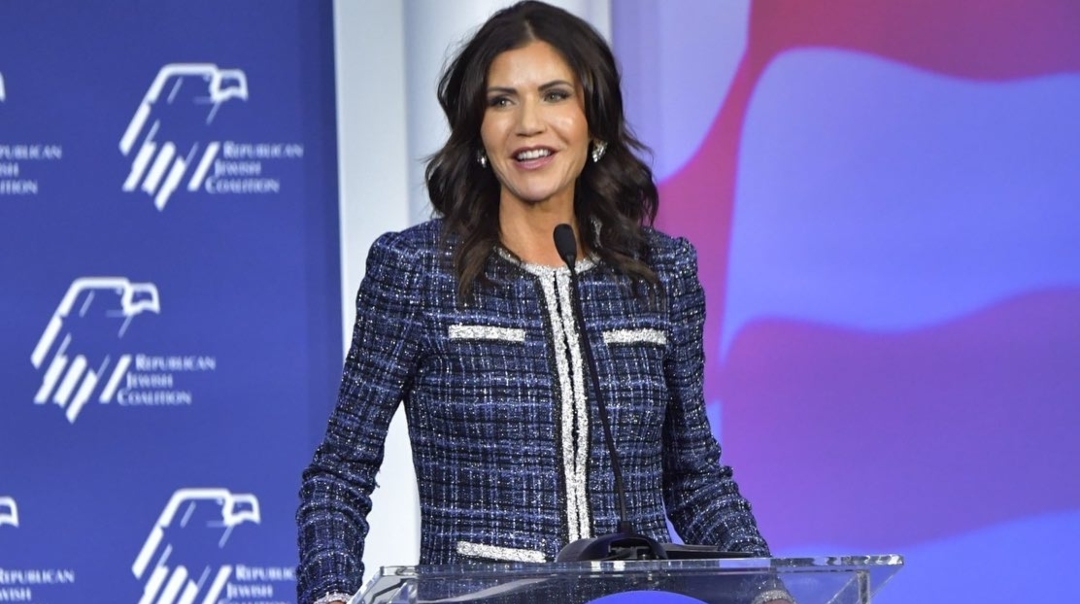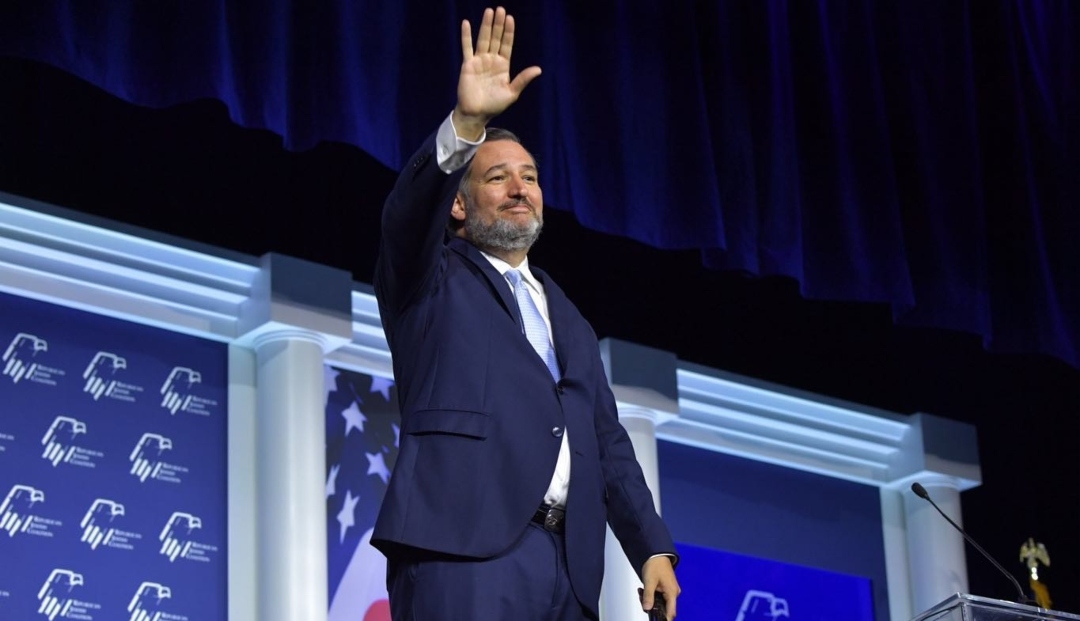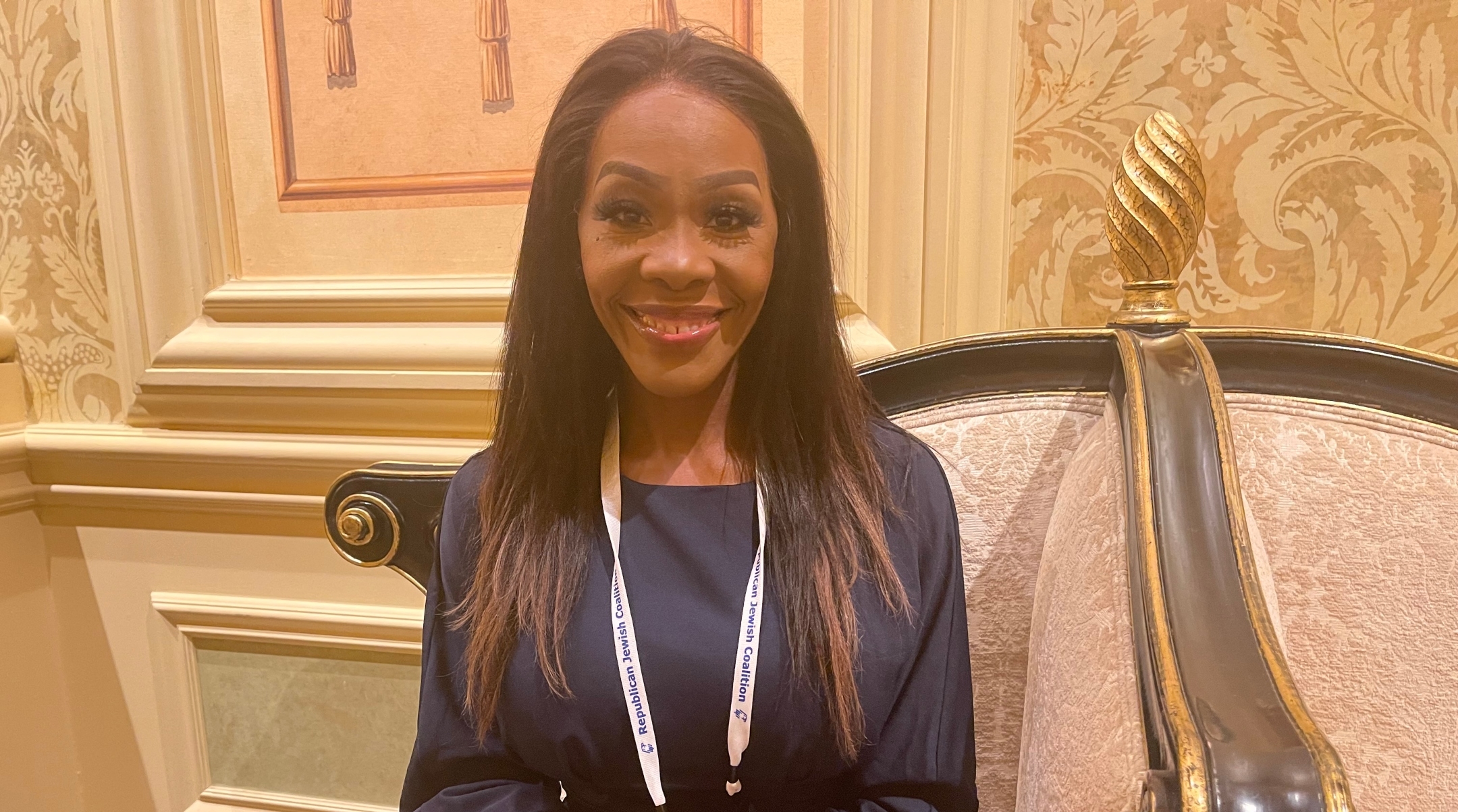LAS VEGAS (JTA) — The Republican Jewish Coalition conference was about 2022, and also 2024. It was about how a near Republican sweep in state and local races last week revealed a way back to GOP control of the federal government. It was about moving more Jews from D to R.
What the conference this weekend was not about, the organizers wanted you to know, was Donald Trump.
“It’s about the here and now, it’s not about President Trump or anybody else,” Ari Fleischer, an RJC board member, told reporters on Saturday, the second day of the RJC confab.
Except it was very much about Donald Trump, who featured in every speech, and in many of the conversations in the halls of the Venetian resort in Las Vegas, where the conference takes place annually.
Trump popped up in appeals from loyalists like adviser Kellyanne Coneway to uphold his legacy and in appeals from 2024 wannabes like former New Jersey Gov. Chris Christie and South Dakota Gov. Kristi Noem to move on.
Trump appeared himself in a video where, flanked by two U.S. flags, the president still wounded by his inability to win a majority of the Jewish vote, once again argued for Jewish hero status.
“No president has ever been a better friend to the state of Israel, and I’m very proud of that,” he said.
And Trump echoed in the rancor that his presidency seeded throughout the country. Chants of “Let’s Go, Brandon!” kept breaking out on the floor, upending speeches crafted to build on the optimism generated by last week’s GOP victories. There is no Brandon; the phrase has emerged in Republican circles as a euphemism for “F— Joe Biden.”
The mood on the stage and in private conversations off stage was elated, even “ebullient” as RJC CEO Matt Brooks put it, given the party’s electoral victories last week.
But Trump haunted a conference that was supposed to focus on helping the party recover from his loss and the turmoil he spurred in its wake, as well as on strategies to bring more Jewish voters into the Republican Party. Trump’s false claims of election fraud inspired the Jan. 6 deadly insurrection at the U.S. Capitol.
His influence with the base means he can’t be counted out, insiders at the RJC event said, which is a frustration to the Republican Jewish fund-raisers who want to rally around 2022 candidates who will win back Congress and a 2024 candidate who is capable of ousting President Joe Biden. Trump, they say, is gold with the GOP base needed to win primaries and poison with the independents needed to win elections.
“No one can come out and run for president as long as he’s there,” said one operative, who spoke on condition of anonymity.
Another frustration, according to RJC insiders, is the damper Trump puts on outreach to Jewish voters, especially considering suggestive evidence that Virginia governor-elect Glenn Youngkin and Jack Ciattarelli, who nearly wrested the governorship from New Jersey’s Phil Murphy, made inroads among Jews in their states. Both men made gains in suburbs where Jews have a substantial presence, and where Trump fared poorly last year against Biden. Trump on the ticket might have inhibited turnout for Republicans.
Few people would agree to be named criticizing Trump for fear of incurring his wrath.
An exception was Chris Christie, the former New Jersey governor who is considering a 2024 run — as were about a half dozen of the major GOP figures at the conference speaking and working the halls for donations to potential campaigns. (No one has declared yet, in large part because of Trump.)
Even Christie framed his criticism of Trump by making a point of his fealty to the former president.
“Of all the people who say they supported President Trump, nobody gets behind me,” said Christie, who was the first primary candidate in 2016 who dropped out and endorsed Trump. “I started that, but let me tell you something else. We can no longer talk about the past.”
Christie said that Trump’s fixation on the 2020 election was a loser for the party. “No matter where … you stand on that issue, no matter where you stand, it is over. Every minute that we spent talking about 2020, while we’re wasting time doing that, Joe Biden, Kamala Harris, Nancy Pelosi and Chuck Schumer are laying ruin to this country,” he said referring to the president, vice president, U.S. House of Representatives speaker and Senate majority leader.
Christie’s message earned middling applause and no boos.
Significantly, Lee Zeldin, the Republican Jewish congressman running for New York governor, embraced Christie’s don’t-look-back messaging. Unlike Christie, whose relationship with Trump and his family was often acrimonious, Zeldin was one of Trump’s fiercest defenders in Congress.
Yet even Zeldin said in a briefing with Jewish media that he would not litigate 2020 in his own gubernatorial run, and that he was unlikely to invite Trump to campaign for him in New York.
“If you’re competing for a Democrat [sic] vote in the South Bronx, and you’re a week away from the election, maybe the best surrogate is that local Democratic New York city councilman who’s explaining to that voter, ‘Listen, I’m a Democrat, and I’m voting for Lee Zeldin, and here’s why,’” he said. “We’re going to be smart in how we approach this campaign, understanding that at the end of the day we might be battling for votes in Flushing, Queens,” a Democratic enclave.

South Dakota Gov. Kristi Noem speaks to the Republican Jewish Coalition in Las Vegas, Nov. 5, 2021 (Republican Jewish Coalition)
Another possible 2024 candidate, South Dakota Gov. Kristi Noem, once a strong Trump defender, barely mentioned Trump in her address. Instead, she called for a truce in the culture wars that defined Trump’s presidency.
“We live in a country that is addicted to being offended,” said Noem. “I’m going to ask you to get over yourself. There are people in your life you’ve quit talking to. Start talking to people again.”
Much of the talk at the conference was about how Youngkin encroached in his Virginia victory on an area once thought to be Democratic territory, education. Youngkin pushed back against vaccine mandates that kept schools closed and embraced the culture wars against teaching racial equity and gender diversity in schools.
Speaker after speaker said education was the new Republican issue. Florida Gov. Ron DeSantis, another likely 2024 candidate, gave a red meat speech in which he celebrated his suppression of liberal expression and his advance of conservative values in schools.
“We have banned critical race theory,” DeSantis said to applause, using the conservative byword for racial equity teaching. Instead, he said, he was encouraging teachers to embrace a conservative message. “We’ve been offering a civics boot camp for teachers. we’re giving them a $3,000 bonus if they go through the program.”
RJC officials said focusing on schools could resonate with suburban Jewish voters whose lives have been upended by the pandemic closures.
“We have been talking about education as a Jewish value, whether it be school choice or parental involvement, for a long time, so this is not new,” Brooks of the RJC told reporters. “It’s coming to the forefront but we know that this issue has resonated with Jewish voters for a long time.”
Youngkin was often cited in the hallways as a template for threading the Trump needle: He embraced the former president’s culture war strategies while keeping him — and his divisive rhetoric — at a distance.
That wasn’t a uniform outlook. Some speakers chided the crowd for the implicit criticism of a president who was a champion of many things Republicans hold dear, especially when it comes to Israel.
Kellyanne Conway, one of Trump’s closest advisers, said she had just seen Trump in Mar-A-Lago, his Florida retreat, and that he regretted not being able to attend the RJC conference because of his commitment to an event honoring his wife.
“I don’t think that we should shy away from laying down the facts that Donald Trump’s pro-Israel presidency was sandwiched between Barack Obama’s and Joe Biden’s,” she said.
Mark Levin, the fiery talk radio host, closed off the conference with a stemwinder speech mocking Zeldin and others for sticking to “kitchen table” issues in their campaigning and not embracing Trump’s cultural war against “Marxists.”
No speaker dared declare themselves a candidate for the presidency, but the speeches hit all the right presidential spots for this crowd, reviewing and pledging to uphold the right-wing pro-Israel riches of Trump’s presidency, including moving the U.S. embassy to Jerusalem, normalizing agreements between Israel and four Arab states, and exiting the Iran nuclear deal.
Some hopefuls, including Noem and Christie, stressed the “kitchen table” issues that irked Levin, while others went all-in on Israel, including Texas Sen. Ted Cruz, former Ambassador to the United Nations Nikki Haley, former Secretary of State Mike Pompeo and former Vice President Mike Pence.
Cruz’s pitch was that he was whispering into Trump’s ear to get him to adopt pro-Israel policies. “I engaged actively directly and repeatedly with the president,” Cruz said, doing battle against Trump administration officials who wanted Trump to be more cautious on Israel issues.

Sen. Ted Cruz, R-Texas, speaks at the Republican Jewish Coalition conference in Las Vegas, Nov. 5, 2021 (Republican Jewish Coalition)
The culture war frequently broke through. Cruz and others encouraged the “Let’s Go, Brandon” chant. When it broke out during his speech, Cruz was ready: He tried to describe in G-rated language a meme he liked. “People all over the country want to have sex with me!” Cruz said, mimicking Biden.
At least two speakers peddled to a receptive Jewish audience tropes that some liberal and Jewish groups allege are antisemitic, a signal of how the Jewish community can be as polarized as the country. Levin blamed the 20th-century Jewish philosopher Herbert Marcuse and his mostly Jewish “Frankfurt school” of thinkers for the woes afflicting 21st century America. DeSantis said he would not allow Facebook founder Mark Zuckerberg to bring his voter enfranchisement philanthropy into Florida, referring to it as “Zuckerbucks.”
An appeal for less partisanship came from an unexpected source: Miriam Adelson spoke briefly at a portion of the conference dedicated to remembering her husband Sheldon, the billionaire casino magnate who was a major funder of GOP and Jewish causes and who died earlier this year.
“The third word of this organization’s name, ‘coalition’, is more crucial than ever,” she said. “We must strengthen the [pro-Israel] partnership both within the party and across the aisle. We must strive for more unity among Jews, no matter the denomination.”
Adelson seemed frail, and she made no secret of how much she missed her husband. She recalled the only other time she appeared before the group without her husband, a decade earlier, when he had a last-minute bout of the flu. “In this year, I stand alone again,” she said to a silent hall.
Her appearance, and the fact of the RJC convening at the Venetian, made it clear that she would continue his philanthropy.
“This weekend should give us all confidence that his remarkable legacy will endure,” Ron Dermer, the former Israeli ambassador to Washington said, introducing Miriam Adelson. “It will endure because you can bet that Miri is going to do everything in her power to make sure that it endures.”
Yet there was little doubt that the landscape for Jewish Republicans had been changed, perhaps ineradicably, by Trump. Just as the conference launched on Friday night, CNN’s Jake Tapper hosted a two-hour special interviewing the Republicans who dared stand up to Trump on Jan. 6. All were pro-Israel stalwarts, once feted by the community, such as Rep. Liz Cheney of Wyoming and Rep. Anthony Gonzalez of Ohio. None was present in Las Vegas.
Among those working the halls, however, were Trump-adjacent congressional hopefuls, including Eric Greitens, the Jewish former governor of Missouri who resigned in scandal in 2018 and who now is seeking the state’s U.S. Senate seat. Greitens was accompanied by Boris Epshteyn, a top Jewish adviser to Trump.
Also working the halls was Cicely Davis, a longshot GOP challenger to Rep. Ilhan Omar, the Democratic congresswoman from Minnesota who is one of a handful of backers of Israel boycotts — and was one of several bogeymen to pop up in just about every speech at the RJC convention. Davis, who says she escaped the “Black monolith” of Democratic voting when Trump emerged as a candidate in the 2016 election, was until recently a leader of “Blexit,” a group of Black pro-Trump Republicans.

Cicely Davis, a Republican congressional candidate in Minnesota, poses at the Republican Jewish Coalition conference in Las Vegas, Nov. 6, 2021. (Ron Kampeas)
“It’s been fantastic being here at RJC,” she said in an interview. “I’m really loving the culture. I just unapologetically stand with the Jewish people and against the rise of antisemitism that is coming particularly from Ilhan Omar.”
Shucking Trump entirely was never going to happen, said Fred Zeidman, an RJC board member who has sparred with Trump at times and has backed him at others.
“Trump still has an incredible influence on the primary process,” Zeidman said in an interview. “So if you distance yourself from everything Trump I think the ability to win primaries, understanding who the primary voters are, is going to be virtually impossible.”
Zeidman spoke to JTA in a cafe in the vast complex that is the Venetian. A few tables away, a few grassroots Jewish Republicans who were attending the conference bore out his claim.
“Rejection [of Trump] would be a big mistake in my opinion,” said Tony Lefco, 73, a retired lawyer from Sarasota, Florida. His friend, Esther Borsuk, 59, a lawyer, chimed in, “I think people would stay home if they thought establishment Republicans were rising up again. That would be a huge blow to the America First agenda.”
Moshe Cohen, an immigrant from France who said he appreciated Trump’s efforts to curb illegal immigration, said the former president had changed the GOP for good, so it was no use marginalizing him.
“Trump has changed the Republican Party, I think forever, because he showed that you can win by, you know, being true, being direct, speaking to the people,” said Cohen, 44, a luxury food entrepreneur from Miami. “His message is very good: America first.”
JTA has documented Jewish history in real-time for over a century. Keep our journalism strong by joining us in supporting independent, award-winning reporting.






